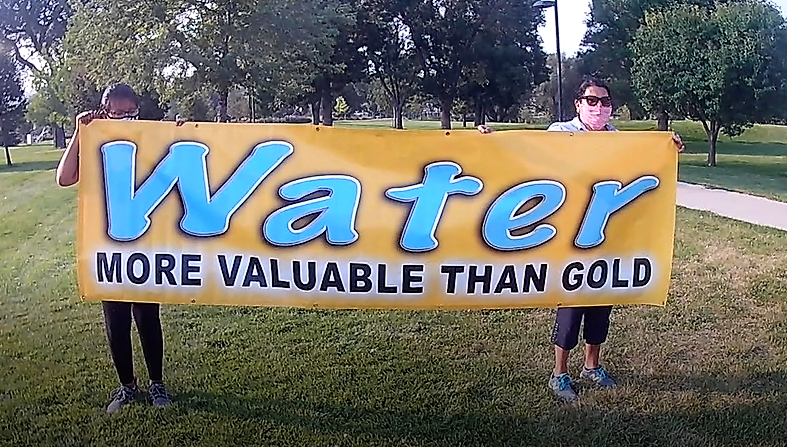State lawmakers face public’s water rights issues

At a September event in Rapid City, water protectors raise awareness: The opportunity to take part in the decision-making process on water permits by filing petitions with the South Dakota Department of Environment and Natural Resources would be knee-capped, if the agency’s proposed HB1028 is approved in the current state legislative session. COURTESY / Rapid Creek Watershed Action
PIERRE — Over the past several years, tribal government, Native citizenry, allies, and accomplices have petitioned to intervene in state water permit proceedings where the proposals under consideration could have severe negative impacts on natural resources and communities.
Those proposals include the TC Energy Corp.’s Keystone XL Pipeline, Powertech-Azarga’s Dewey-Burdock in situ leach uranium mine, and Mineral Mountain Resources’ proposed gold mine near the Lakota tribal trust land of Pe’ Sla — all Canada-based projects seeking water in unceded 1868 Ft. Laramie Treaty territory.
The opportunity to take part in the decision-making process on water permits by filing petitions with the South Dakota Department of Environment and Natural Resources would be knee-capped, if the agency’s proposed HB1028 is approved in the current state legislative session.
The bill’s strict criteria for eligibility, or “standing”, would admit only petitioners who prove they would suffer an individual threat “unique from any injury suffered by the public in general.”
The bill is entitled “An Act to revise petition requirements and the criteria for issuance of a water right permit.”
It qualifies specific personal injury concerns that meet pre-established code requirements and fit the format for petition provided by the Chief Engineer. Additionally, the bill limits the scope of “public interest” when it comes to approving or denying water permits.
“These criteria are clearly meant to shut out from the public process citizens who have serious concerns about threats to our public water, as well as potentially diminishing standing of organizational and government entities whose members will be adversely impacted,” the statewide non-profit Dakota Rural Action warned in its weekly legislative update.
“Rather than welcoming citizen input and participation in the process, the DENR is now seeking to severely limit that participation by filing HB1028,” the grassroots organization said.
The bill has been assigned to the House Agriculture & Natural Resources Committee, though not yet scheduled for discussion. The names of committee members and their contact information is HERE.
Compounding the water protection debate at the statehouse is a proposal from the Governor’s Office to merge the Department of Agriculture with the Department of Environment and Natural Resources.
While sustainable practices in farming and ranching can prevent or reverse environmental degradation, much of the conventional agribusiness the state executive promotes instead contributes to the primary sector’s responsibility as arguably the most destructive human activity on the planet.
Since it is with difficulty that policymakers “face major challenges in aligning the private interests of the agri-food sector with public interest in environmental goods,” the idea of fusing the two departments raises the question of maintaining a healthy system of checks and balances.
Dakota Rural Action opposes this merger for many reasons, it says, “including the need to keep our regulatory agency (DENR) focused on protecting water and natural resources for our current and future generations, and not diluting its staffing levels and effectiveness by joining it with an agency designed to promote our state’s largest industry.
“To put it bluntly, quality control should not be housed in the promotions department,” the organization said.
For the proposal to proceed, the governor must submit executive orders to the state legislature within the first five days of session. Either chamber of the legislature can block the merger through a resolution passed by a simple majority.
Legislators’ contact information can be accessed through the Legislative Research Council website at Find My South Dakota Legislators.
(Contact Talli Nauman@gmail.net)
The post State lawmakers face public’s water rights issues first appeared on Native Sun News Today.
